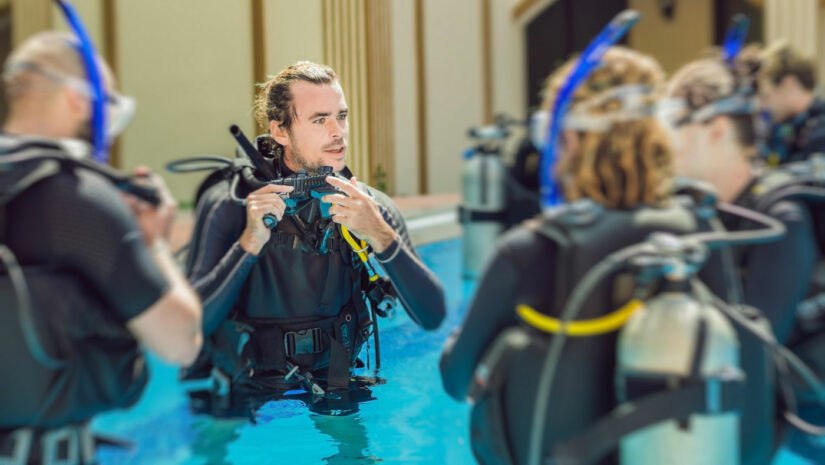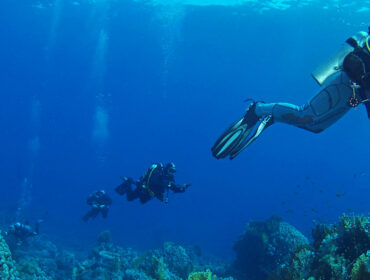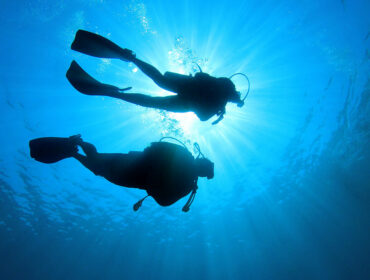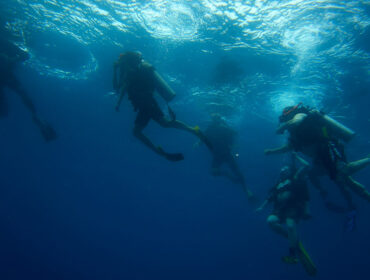Before you can dive into the deep blue waters, one thing you’ll need—aside from your essential scuba diving equipment—is a certification card (or C-Card). This is your license to dive and serves as proof that you underwent proper scuba training. International and local dive shops will ask for this when you buy or rent diving gear, but some dive locations will look for other more advanced types of certifications before letting you explore their waters.
Recreational scuba diving doesn’t have a centralized certifying or regulatory agency, but there are several large scuba organizations and diving schools that offer certificates. But, of course, you only get it after enrolling and completing their open water diver courses, where you gain significant knowledge, skill, and experience in specific diving principles.
These regulatory agencies consist of trained and certified in-house instructors who then pass on their knowledge to individual amateur divers. In addition to offering varying levels of scuba diver training programs, the agencies also regulate the sport as a whole and represent dive masters, dive instructors, dive operators, and other diving professionals. They widely participate in researching dive medicine, promoting marine conservation, and marketing diving as a sport.
At the beginner level, it doesn’t really matter which certification agency you choose as the courses offered are more or less similar across the top training agencies. Any main agency will be recognized by dive operators anywhere in the world. The agencies will usually recognize each other’s qualifications for recreational diving, but this may not be the case once you decide to take up professional diving.
Here are the most recognized scuba diving certification agencies around the world today and the types of scuba certifications that they offer.
Professional Association of Diving Instructors (PADI)
Based in the United States and by far by the biggest and most recognized dive certification agency in the world, PADI was established in 1966 to improve the existing training modules at the time, which were outdated and made it much more difficult to get into diving. They created a variety of courses for scuba, freediving, technical diving, and other diving disciplines, rather than just the one single universal course that was prevalent at the time.
PADI courses are performance-based dive programs. The introductory level emphasizes practical knowledge, safety, and motor skills, along with the foundations of diving physics, physiology, and chemistry.
PADI centers are the most widely spread out across the world, and you can find one at almost any dive destination. More beginner divers are certified by PADI than all other agencies combined. It has certified approximately 70% of divers in the United States and approximately 55% of divers worldwide.
They are also very active in promoting the sport and advocating marine conservation through their Project AWARE operation.
Types of Scuba Certifications Offered
Below are just some of their adult diver certification levels (not including technical diving courses):
- Open Water Diver
- Advanced Open Water Diver
- Rescue Diver
- Master Scuba Diver
- Divemaster
- Adaptive Support Diver
- Adventure Diver
- Scuba Diver
- Assistant Instructor
You can check PADI’s full range of diving certification courses here.
National Association of Underwater Instructors (NAUI)
NAUI started in 1959 and is the oldest recreational scuba certification agency in the United States. NAUI is a non-profit association that was established for the promotion of dive safety through education. Its diver courses are very similar to those conducted by PADI, and it enjoys the status of being the second largest scuba certification agency in the world.
NAUI boasts a number of celebrities and industry pioneers that they have certified, like Kevin Costner, Tiger Woods (NAUI divemaster member), Cameron Diaz, Jacques-Yves Cousteau (inventor of the Aqualung), and many more.
As of 1997, NAUI has published standards for teaching technical diving as well.
Types of Scuba Certifications Offered
NAUI offers the following popular scuba diving certification levels, among many others:
- Try Scuba/Passport Scuba
- Tandem Scuba Diver
- Scuba Diver
- Enriched Air Nitrox (EANx) Diver
- Advanced Scuba Diver
- Rescue Scuba Diver
- Master Scuba Diver
- First Aid Provider
- Night Diver
- Deep Diver
- Divemaster
- Underwater Imaging
- Public Safety Diver
For more information on their wide range of courses and certifications, you can click here.
British Sub Aqua Club (BSAC)
Founded in 1953 and based in the United Kingdom, BSAC is the largest dive club in the world. With over 50,000 members, it has been recognized as the official governing body of recreational diving in the UK.
BSAC operates through 1,600 local independent dive clubs and over 400 diving schools worldwide. Given that UK waters are relatively cold and have restricted visibility, BSAC training emphasizes rescue training very early on in the program.
Types of Scuba Certifications Offered
BSAC currently offers the following certification courses that can serve as prerequisites to their more advanced skill development and instructor courses:
- Ocean Diver
- Sports Diver
- Dive Leader
- Ice Diving
- Advanced Diver
- First Class Diver
You can find the full list of BSAC certification courses here.
Confédération Mondiale des Activités Subaquatiques/The World Underwater Federation (CMAS)
CMAS is the international umbrella organization for diver training organizations. Founded in 1958, CMAS is based in France. The organization offers the international framework for diver and instructor qualifications, and the members of the CMAS Council are representatives of other recognized dive agencies.
The training philosophy of CMAS members originates from professional or military diving backgrounds and tends to reflect the full range of European and world diving standards. The difference in the philosophy for diving between CMAS and US-originated dive education is very distinct as their ideology is entirely about quality education over profit, which accounts for its courses being taught worldwide in more dive schools than dive shops.
Types of Scuba Certifications Offered
CMAS currently offers a long list of international diver certification programs, including the following:
- Introductory SCUBA
- Advanced Skills Diver
- Apnoea Diver
- Enriched Air Nitrox Diver
- Underwater Navigation
- Night Diver
- Rescue Diver
- Wreck Diver
- Cave Diver
Click here for the list of CMAS dive training courses.
Scuba Schools International (SSI)
With 35 regional centers and area offices around the globe, SSI was established in the ‘70s in the United States. It has well over 2,200 authorized dealers and supports dive businesses and dive resorts. A major difference between SSI and other diver education organizations like PADI, NAUI, CMAS, and others is that SSI is a retail-based organization that intends to ensure the quality of training worldwide.
SSI also teaches the basic theories through their online academic sessions before putting those theories into practice with monitored scuba diving training in confined water/pool sessions.
To complete the course, students will have to go on at least four open water adventure dives to achieve their Open Water Diving Certification.
Types of Scuba Certifications Offered
SSI offers the following certification courses, among many others:
- Scuba Diver
- Open Water Diver
- Enriched Air Nitrox
- Night Diving
- Wreck Diving
- Deep Diving
- Master Diver
You can learn more about how you can start your training with SSI here.
Scuba Diving International (SDI)
Founded in 1998, Scuba Diving International (SDI), a sister agency of Technical Diving International (TDI), has maintained a firm presence in the diving industry. It was created by professional educators who know what is needed to educate qualified divers at all levels.
SDI offers many options for personal development. Following your first scuba course, there are literally dozens of continuing education opportunities for you to follow. Taking a course with SDI will allow you to learn to dive with confidence and have fun in your local waters or oceans worldwide. In addition, SDI offers an easy-to-follow educational system for personal development and a proven pathway to dive leadership, should you desire a career as a dive professional. Divemaster, Assistant Instructor, and Open Water Instructors are among the professional level courses offered and are available online.
With more than 24 international offices and thousands of dive centers and instructors around the world, SDI certifications are recognized by dive centers, charter operators, and dive destinations worldwide. Get ready to be plugged into the most innovative educational system in the world diving industry, starting with your first experience with SDI.
Types of Scuba Certifications Offered:
Below is a small sampling of the scuba diving courses SDI offers:
- Open Water Scuba Diver
- Advanced Adventure Diver
- Computer Nitrox Diver
- Solo Diver
- Wreck Diver
- Sidemount Diver
- Night/Limited Visibility Diver
- Rescue Diver
- Scubility Diver
- Divemaster
- Scuba Instructor
Click here for more information and to see their full line-up of courses.
In case you’re looking for other agencies that are well known around the world, you may check out the following:
The International Diving Educators Association (IDEA)
The American Canadian Underwater Certifications (ACUC)
The Professional Diving Instructors Corporation (PDIC)
The Scuba Divers International/Technical Divers International (SDI/TDI)
To shop for Scuba Diving Equipment, visit Scuba.com.





